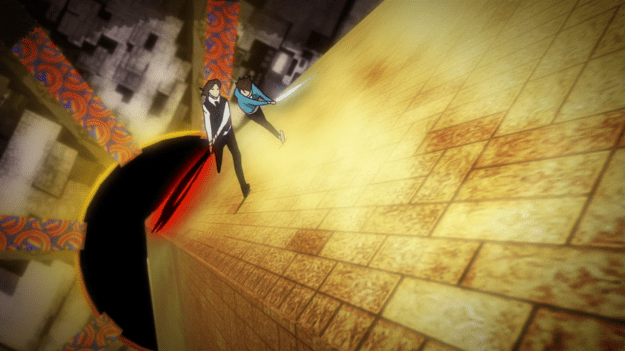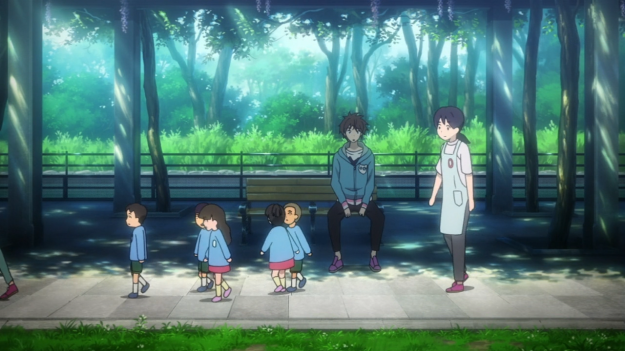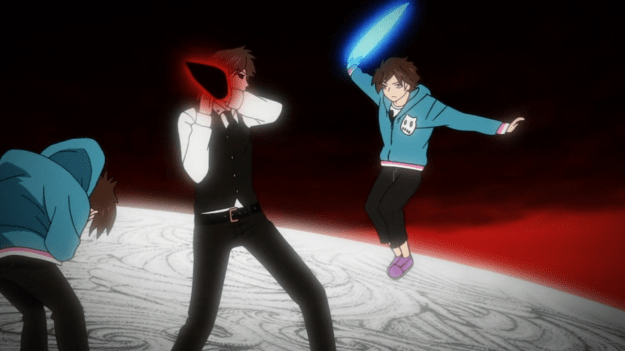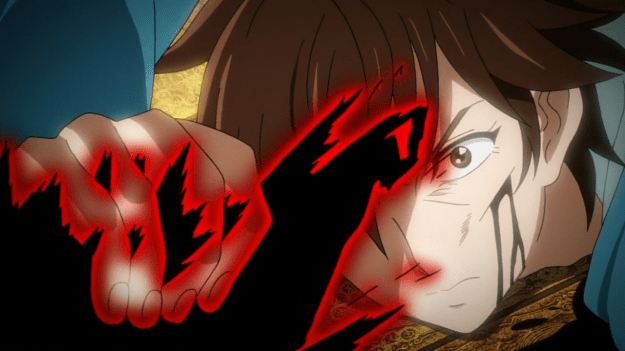Before I jump into my reaction of [C]‘s final episode and the series as a whole, let me talk a bit about Inception.
In case some of my readers are hermits with an absolute disdain for Western cinema, Inception is a recent Christopher Nolan blockbuster. More importantly, it is a blockbuster with a relatively high concept: the nature of dreams, our subconscious, et al. As highfalutin as that sounds, however, Inception combined car chases, snow mobile chases, gun fights, rough and tumbling in a rotating hallway and more. The general public, for the most part, came away with high praises.
Not everyone agreed. Certain critics bemoaned Inception’s ‘summer action’-ness, if that makes sense. For a movie about esoteric concepts, Inception was no different from any other action thriller, albeit well-polished. Critics lambasted Nolan’s heavy use of exposition, for instance, in the first half of the movie, leaving little to the imagination. Critics found Inception’s dreamscapes inspiring and stoic. To put it bluntly, some people found it disappointing that Inception didn’t aim high enough.
Let me make this clear — I enjoyed Inception. The criticism mentioned above are all valid, but in the end, Inception was still a good movie. Having said that, I want to say that [C] faces a lot of the same problems as Inception. Like Inception, [C] explores an esoteric topic — as esoteric as the stock market, futures, and such can get — through a narrative. Like Inception, however, [C] utilizes action to get its point across. Like Inception, [C] spends much of its time mired in exposition. Whereas Inception still ended up as a fun summer blockbuster, however, [C] stumbles.
To some degree, we are talking apples and oranges. Inception is a Hollywood movie with a budget to the tune of 160 million dollars — certainly no chump change. [C], on the other hand, is a TV broadcast anime. This, however, is precisely the point. I can’t say with any certainty why [C] isn’t as good as it could have been, but it’s evident that the budget for the series was not very high. It was also clear that the story wasn’t given much time to flesh its details out despite devoting much of its time to exposition dumps.
Inception may not have aimed high, but thanks to its talented director and a ton of money, it is nevertheless a fun action movie. [C], with its many limitations, comes across as a poorly animated shounen with rushed character development and a muddled message about money. Without the chops to deliver thrilling action, [C] may have opted to aim higher, but then it runs the risk of boring its audience with its topic (or even worse, become weird for weird’s sake like Trapeze). Indeed, [C] is a high-potential show done in by virtue of its format.
Anyway, [C]’s finale plays out as expected. Kimimaro and Mikuni battle one another for Japan’s fate. Mysu and Q complement their Entres’ struggle with a battle of their own. Meanwhile, scenes of Japan in disarray are dispersed throughout the episode.
Continuing from where we left off last week, ‘C’ is boomeranging right back to Japan from the US. Oddly enough, the suits in the IMF can literally track ‘C’ progress as it makes its way across the Pacific as, naturally, a giant black C. Kimimaro and Mikuni trade philosophies, as do Msyu and Q, but if you’re planning to engage yourself in this tantalizing debate of “present versus future,” you may as well stop now. At the episode’s conclusion, Deus extracts itself directly from the machina to tell Kimimaro that everyone’s right!
Nevertheless, Msyu prevails in convincing Q that this struggle must stop! Without her support, Mikuni is as good as dead anyway as Kimimaro delivers the winning blow. If I don’t have much to say, well, what is there to say about a final boss fight? The problem with [C]’s “everyone’s right” cop-out is that Kimimaro’s victory ultimately feels cheap. In the end, he only had to “sacrifice” Msyu to save everyone’s future. Despite what you may have expected, reversing Mikuni’s action doesn’t come at the expense of the ‘present’ or whatever. This would have resulted in a truly bittersweet ending in which our hero must weigh the pros and cons. Instead, he only loses the love of a magical pixie girl so as such, it’s hard for me to really empathize with such a heroic sacrifice. The whole “present versus future” dichotomy was all for naught.
Reset button endings are never satisfying as they are gutless. In saving Japan’s future, the streets are green again. Instead of those dirty hobos, we get mothers and their children playing idyllically in the park. Kimimaro’s co-worker gets to go back to his menial convenience store job that he takes so much pride in. Even Sato was revived in the reset. In a struggle where nothing was lost, there was ultimately no struggle.
Stray observations:
• In the end, Msyu gets to kiss Kimimaro ’cause her love for him grew 40x. Even then, the kiss occurs offscreen. What is so scary about anime characters locking lips? I mean, seriously, was this necessary?
According to Nyororuron, the Wikipedia entry for [C] thinks that Msyu is modeled after Kimimaro’s future daughter. Now, I ain’t saying y’all are wrong, but you realize this makes the kiss and romance throughout the series kinda creepy, right?
• The powerful Japanese yen, huh? What’s stranger — that or the American dollar becoming the official currency in Japan?
• I admit it: this episode was fun to watch. It’s not, however, because the final battle blew me away or anything. [C] has had problems sequencing together a single cohesive battle scene all season long. They never figured it out in time for the finale. The ‘QUALITY ANIMATION’ in this episode was the funniest thing I had recently seen in anime.
But seriously, what the hell is this thing?












Everything went according to FD’s keikaku. O_O
Damn the FD and its nakama of Masakaki’s!
Oh [C] reminded me of Inception too (I freakin’ love that movie!!!) and I find them similar in several ways… but, yeah, sadly [C] didn’t seem to have been as successfull.
[C] just didn’t have the capacity to achieve what it wanted to, unfortunately. I can’t say I didn’t enjoy it, but it was ultimately a bit of a letdown with little resolution. As far as ambition goes though, I think it was the most daring of the season. Not necessarily the best, but it tried to do something different that left me feeling ambivalent towards it.
I admire the amount of thought that went into (most of) it though, even if it stumbled and faffed around a bit where it shouldn’t have.
It’s hard for me to say just how daring [C] was. It took an interesting concept but turned it into Pokemon. Like Inception, which took something similar to Last Year at Marienbad and added guns and car chases to it. Like taking an exotic meat and making hamburgers out of it.
Think about the competition as far as trying new things goes this season. No doubting how disjointed those deals were though, which limited my wide eyed gawking by a fair amount.
Eh. Again, it can be daring in one way and completely conservative in others. The big picture tells me that [C] just didn’t have the cojones.
Well it DID have to have the requisite love interest, which felt rather shoehorned in. In that regard, it tried to follow well established if not entirely validated trends.
But I’ll give it to you that it could’ve gone places with its premise, but it just didn’t.
Oh E Minor. Your videos make these posts worth reading. The spot on criticism is just a cherry on top.
Thanks for the appreciative note, but I’m sure you don’t — can’t! — feel that way about the video in the latest Ano Hana post. It seemed like a good idea in the conceptual stages, but damn, the result was a mess…
The Inception comparison is a good one.
In the case of both Inception and C, I get a sense that the creators behind these shows had to spice up their idea with standard action fair in order to get the key execs to sign off on them.
That wasn’t a major problem with Inception, but it did hurt C. Partly since C’s “Deals” are very nonsensical, in which rules and attack maneuvers seem to be total asspulls. And yeah, not showing the kiss in this episode is silly.
And yes, the reset end is such an awful copout.
All-told, this was a bad end, imo. I did enjoy the episode in a “lolwut?!” way, but that’s about it.
I think after his two Batman movies, Nolan was allowed to make anything. He also said Inception had been ten years in the making. Of course, he could be lying, but I don’t think the man has ever really made a meditative movie. They’re always sleek and impressive, but they lack a certain je ne sais quoi.
The romance might have been extraneous and unnecessary, but man, I wish anime would finish the job. What I mean by this is that if you’re going to start a plot (or subplot), finish it. The kiss was the finish. It’s the catharsis.
Plus, I’ve never understood anime’s coyness toward the act. The medum that’s willing to show any perverse bodily contact can’t handle a simple kiss? It’s a little neurotic.
`I think of the whole dilemma of [C] instead of as directly “fight for the future” or “fight for the present”, as old vs. young.
To me there are some parallels with the current situation in the world. People are becoming increasingly connected thanks to social networks and those who make the laws aren’t really changing with the times. One person’s input isn’t necessarily so insignificant any more. The people who are seeing all the possibilities of the future are really wondering whether the politicians and CEOs have the best interests of the younger generation. We see it in the revolutions of the middle east as young people rise up to overthrow dictators. We see it in the increasing number of young people voting and trying to make a difference. The fact of the matter is I think a lot of young people are concerned that the decisions being made by the generation currently in power, are not in the best interest of those who will come after them. That the decisions they make are just to bring themselves comfort for the time they have left.
The other issue with [C], somewhat related to the above is the necessity for a universal currency and more cooperation between the world economy. The necessity to realize that wealth flows across borders and the effects of one economy on another.
I don’t know how Kimimaro’s decision affects the present. Maybe it’s just trying to say that while both are right it’s the person who has control that gets to make the decision on what will be in the best interest for the world going forward.
Well, your explanation is an interesting take, but the fact of the matter is that [C] sets up this big boogeyman about how the collapse of the FD will cause the present to literally disappear. This isn’t just greedy CEOs and politicians looking out for themselves. Countries will disappear. One thus assumes that if Kimimaro stops Mikuni to save the future, he has to give something up. Then the ending arrives and it’s a perfect ending all because it was through the hands of the shounen hero. That cheeses me.
I’m not sure [C] adequately explored this.
I was just watching the Adjustment Bureau the other day and while that movie was a test of free will, in some sense you can see the whole financial district as a test of ethics within the [C]. Perhaps we are supposed to see what happens when those ethics fail i.e. whole countries wiped out, versus when they succeed i.e. the future is restored.
As for the other bit yeah probably not. I was just going on the ripple effect of the actual C thing and the fact that dollars was the new currency at the end of the show. I personally think the show was built more for subtext and social commentary than plot.
Coincidentally have you read any of Michael’s posts at animeotaku? http://animeotaku.animeblogger.net/category/serious/anime/c/ They are really good if you want to get into the symbolic and philosophic bits of C.
Kimimaro’s actions are the only correct course of action from the events of the anime. That much, I think we should agree upon. But what was his noble sacrifice? I didn’t see him do anything on the scale that would allow Japan’s future to be restored. He burned his money and he reversed the rotary. He single-mindedly fought for the future despite pretenses that the present would suffer. Surely enough, the present didn’t suffer, but Kimimaro didn’t know that.
Unfortunately, while you might see a universal currency, the implication to me is econocentrism.
I think the execution of the plot muddles the symbolism far too much.
Nah. Although I’m sure others have far more interesting things to say than me, I don’t really have time to read many blogs outside of the ones belonging to people who directly discuss anime with me here. “Professional” courtesy, I guess.